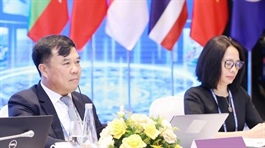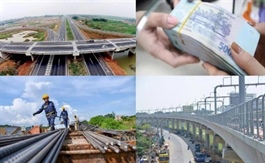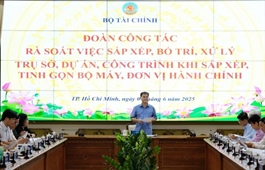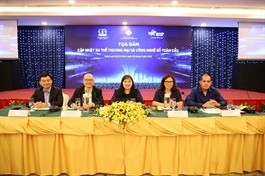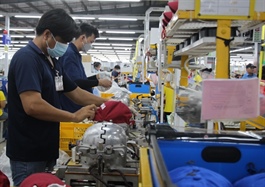Potential in reach for digital tech groups
Potential in reach for digital tech groups
Vietnamese digital tech enterprises are increasingly asserting their position through self-reliance, innovation, and ambition to expand beyond domestic borders.
This pioneering spirit was reflected at the Vietnam-Asia DX Summit 2025, which opened on May 27 in Hanoi. The event was organised by the Vietnam Software and IT Services Association (VINASA).
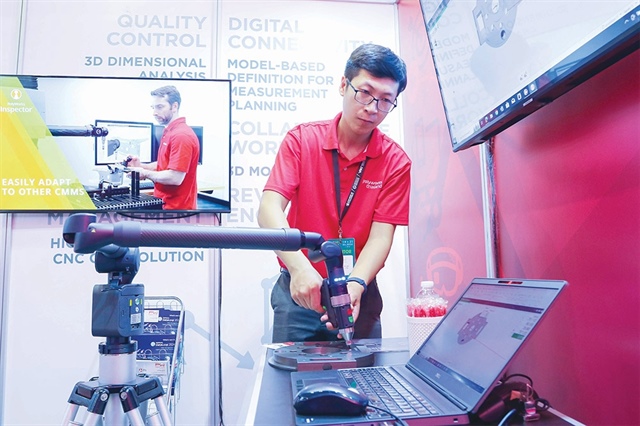
Smaller tech businesses require support to unlock their full potential, photo Le Toan |
The summit brought together over 2,500 delegates, including leaders from ministries, technology enterprises, and experts across Vietnam, along with representatives from 16 countries and economies across the Asia-Pacific.
VINASA chairman Nguyen Van Khoa remarked that Vietnam had entered a new phase in which technology serves as a core engine for sustainable economic growth.
“Never in our development history have science, technology, and digital transformation been placed so centrally in national development strategies,” said Khoa.
Vietnam currently has over 1,000 digital tech enterprises providing services to major international markets including the United States, Japan, Europe, South Korea, and Australia, generating billions of US dollars in annual revenue. With a large, young, and dynamic IT workforce, Vietnam is gradually emerging as an international digital services hub capable of meeting the stringent demands of top-tier markets.
However, Khoa also acknowledged a significant challenge. “Vietnam currently has around 1.2 million IT workers. To meet development demand, that number must at least double to 2.5 million,” he noted.
As of early 2025, Vietnam was home to more than 54,500 digital technology enterprises. Beyond growth in numbers, major players such as Viettel, FPT, VNPT, and One Mount are making strategic investments in developing core technologies to address national-level challenges.
“With a foundation of young, flexible talent and a strong aspiration for global integration, Vietnamese enterprises are becoming pioneers in shaping the digital future, contributing to the goal of the digital economy accounting for half of GDP by 2045,” Khoa added.
Stan Singh, chairman of the Asian-Oceanian Computing Industry Organisation, acknowledged Vietnam’s increasingly prominent role in the region’s digital ecosystem. He noted that Asia-Pacific is currently leading global digital transformation spending, with total investment expected to surpass $1 trillion in 2025.
“In this momentum, Vietnam stands out as a dynamic and visionary partner with the potential not just to catch up but to lead,” said Singh.
To accelerate digital transformation, he outlined six strategic pillars: commercialising innovation, especially among smaller enterprises; enhancing digital awareness across society; fostering regional collaboration between governments, businesses, and academia; developing and exchanging digital talent; connecting tech communities across member economies; and boosting cross-border projects through trade promotion and public-private partnerships.
These efforts, he noted, are crucial to positioning Asia as a leader in the global digital economy.
Dau Anh Tuan, head of the Vietnam Chamber of Commerce and Industry’s Legislation Department, stressed that smaller businesses are a core force in any innovation ecosystem. However, he underlined the need for government support to unlock their full potential, not only through funding but also through transparent, market-aligned policies.
“Government support should not be one-way subsidies,” Tuan noted. “It must be strategic investment, with clear monitoring mechanisms and enterprise-level commitments. We need policies that empower businesses to rise, such as co-funding training programmes or commissioning services from reputable training providers in line with market needs.”
Nguyen Xuan Hoang, vice chairman at management software group MISA, said that the core issue today lies not only in the quality of individual software but in their ability to interconnect and integrate within a comprehensive digital ecosystem.
“Beyond robust solutions for specific locations, we’re seeing increasing demand for holistic ecosystems, where software applications can link and support one another,” said Hoang. “With over 200,000 users currently, MISA has undertaken a comprehensive system review to identify overlaps across its software platforms and enhance user experience.”
However, Hoang acknowledged that the biggest bottleneck remains a lack of synchronisation. “Each organisation is using its own system with unique workflows and operational habits. Imposing a single software solution across the board is not only unrealistic but could provoke user backlash,” he added.
Instead, MISA is proposing a modular approach, designing software as function-specific modules that can be easily integrated or removed based on the needs of individual sectors, localities, or organisations.
“This approach ensures flexibility and delivers tailored support to end-users, the ones most directly affected by technology,” he explained. “We hope to work closely with experts and the tech community to build an open, transparent system capable of serving millions of users in the future.”
|
Vu Anh Tu, CTO, FPT Corporation Vietnam currently has more than 54,500 digital technology enterprises, an increase of 16 per cent over 2023. The total industry revenue reached nearly $152 billion, made by more than 1.2 million employees. This is clear evidence that technology today is no longer just a separate field, but has become the core development infrastructure of the country. We no longer debate whether to digitally transform or not. The question now is how fast we transform to not be left behind. By 2045, the digital economy will account for at least half of GDP. To realise that vision, we believe that AI and green digital platforms will play a role in shaping the future of humanity, and will be the pillar of the group’s growth in the next decade. FPT chooses to stand on the shoulders of giants, taking advantage of existing models, creating more architecture, and training methods to suit the characteristics of Vietnam. The success of DeepSeek has asserted that we can absolutely create AI products with their own value for Vietnamese people. However, we are lacking quality data for training large models, partly because the digital infrastructure is incomplete, partly because the data has not been shared effectively. The solution will be to utilise comprehensive digital transformation in the healthcare, education, and public admin sectors, as well as encourage the sharing of public data for research and development. Doan Manh Ha, CEO, Bkav AI We proposed some solutions to remove difficulties that businesses encounter in developing AI solutions. Regarding stimulus policy, businesses applying AI should be supported with implementation costs from the state budget. In Singapore, the government supports 70 per cent, and enterprises the rest. In Japan, the government-enterprise ratio is 50-50. An open data policy should be issued with non-sensitive data sets, not affecting national security or personal privacy, which can be completely public for AI development. We suggest issuing a set of standards for evaluating AI systems in accordance with legal regulations, cultural norms, and also national interests. Solution is needed for training AI human resources in companies and universities by training and converting IT personnel to AI. Bkav has developed a human resource training initiative for AI development, in cooperation between Nvidia and the Hanoi University of Science and Technology. AI should be included as an evaluation indicator in the National Digital Transformation Index, encouraging enterprises and state agencies to actively apply AI into practice and improve the quality of projects. The government should support Vietnamese enterprises and organisations to participate in international AI associations. It should also build a system of conferences and seminars on AI to encourage the comprehensive development of the AI ecosystem. Furthermore, we need a support mechanism to attract Vietnamese AI human resources working abroad, and hire international AI experts with the state budget. Phan Thi Thanh Ngoc, director of AI Application Consulting, VNPT AI We can see the remarkable development of AI, and generative AI productivity improvements can be worth $1.75 trillion per year for all levels of government. Last year, Vietnam ranked fifth in ASEAN in Government AI Readiness Index with 59 points, following Indonesia, Thailand, Malaysia, and Singapore. This is the third consecutive year that Vietnam has surpassed the world average, ranking 51st in the global AI readiness index. Large corporations in Vietnam invest heavily in developing AI products and services. FPT has built a $200 million AI factory in Japan, and Viettel is developing an AI ecosystem to increase labour productivity for organisations and businesses. Large language models of Vietnamese companies are ranked high globally. Mastering AI and big data will contribute to the development of a digital society, digital economy, and smart cities. Some AI applications in the public sector in Vietnam help with visual data management, security and traffic monitoring, and much more. In smart urban management, AI contributes to socioeconomic management, managing social order and security, public transportation, and emergency response. With the goal of each citizen, civil servant, and public employee having a virtual assistant, helping them access information, answer questions, and support daily tasks, GenAI can be used to develop digital services. AI is also applied to process data and detect social insurance fraud, protect billions of US dollars of health insurance every year, and optimise the process and approval of health insurance payments. |
- 11:07 06/06/2025



